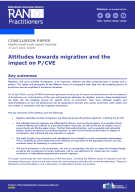Details
- Publication date
- 25 July 2024
- Author
- Directorate-General for Migration and Home Affairs
- RAN Publications Topic
- (Early) prevention
Description
Migration, and more precisely immigration, is an important, relevant and often polarising topic in society and in politics. The reality and perception of the different forms of immigration both feed into the breeding ground of extremism and are exploited in extremist narratives.
On 19 April 2024, a group of RAN Practitioners gathered a small group of experts and practitioners with the objective of broadening our understanding of the way anti-immigrant attitudes can develop, and how these developments can feed into the breeding ground for specific forms of extremism.
They have collected insights and recommendations on how the practitioners can be supported to prevent and counter extremism, both violent and non-violent, in connection with anti-migration sentiments.
The key outcomes of the meeting were the following:
- Negative attitudes towards immigration are observed across the political spectrum, including the far left.
- The attitudes towards migration are influenced by factors, such as the perception of a symbolic threat (national identity and culture) or a growing threat to resources, as well as the loss of citizens’ trust in governments and the European Union. The fact that political parties, such as populist and nationalist parties, exploit sentiments surrounding migration, as well as the framing by the media on aspects of immigration, also influence the way migration is viewed.
- The scale of right-wing extremism and radicalisation has changed to a more mainstream phenomenon. This is amplified by social media that exert influence on large parts of the population that do not hold extremist views, by operating in a grey zone.
- The rise of extremism in the mainstream, not only on immigration, but also on issues like climate change, as well as the involvement of certain politicians, call for new definitions for violent and non-violent extremism, to help address apprehension around migration.
This paper summarises the main takeaways of the discussion, including the different types of migration and antiimmigrant discourses, which are the main drivers for anti-immigrant attitudes and current developments. These are followed by recommendations, and a description of applicable practices and projects.

